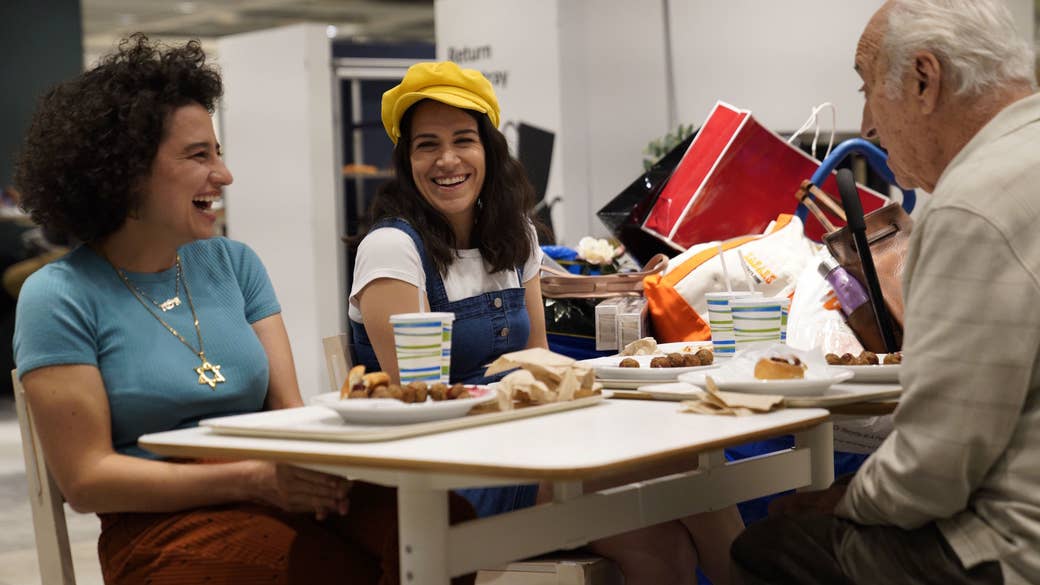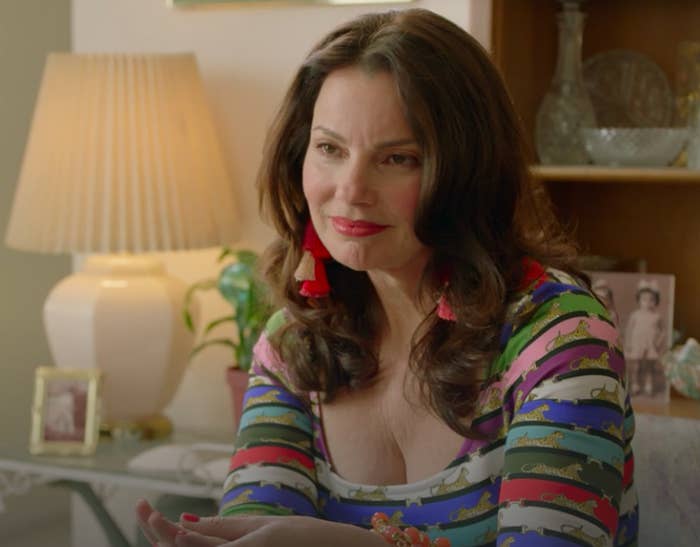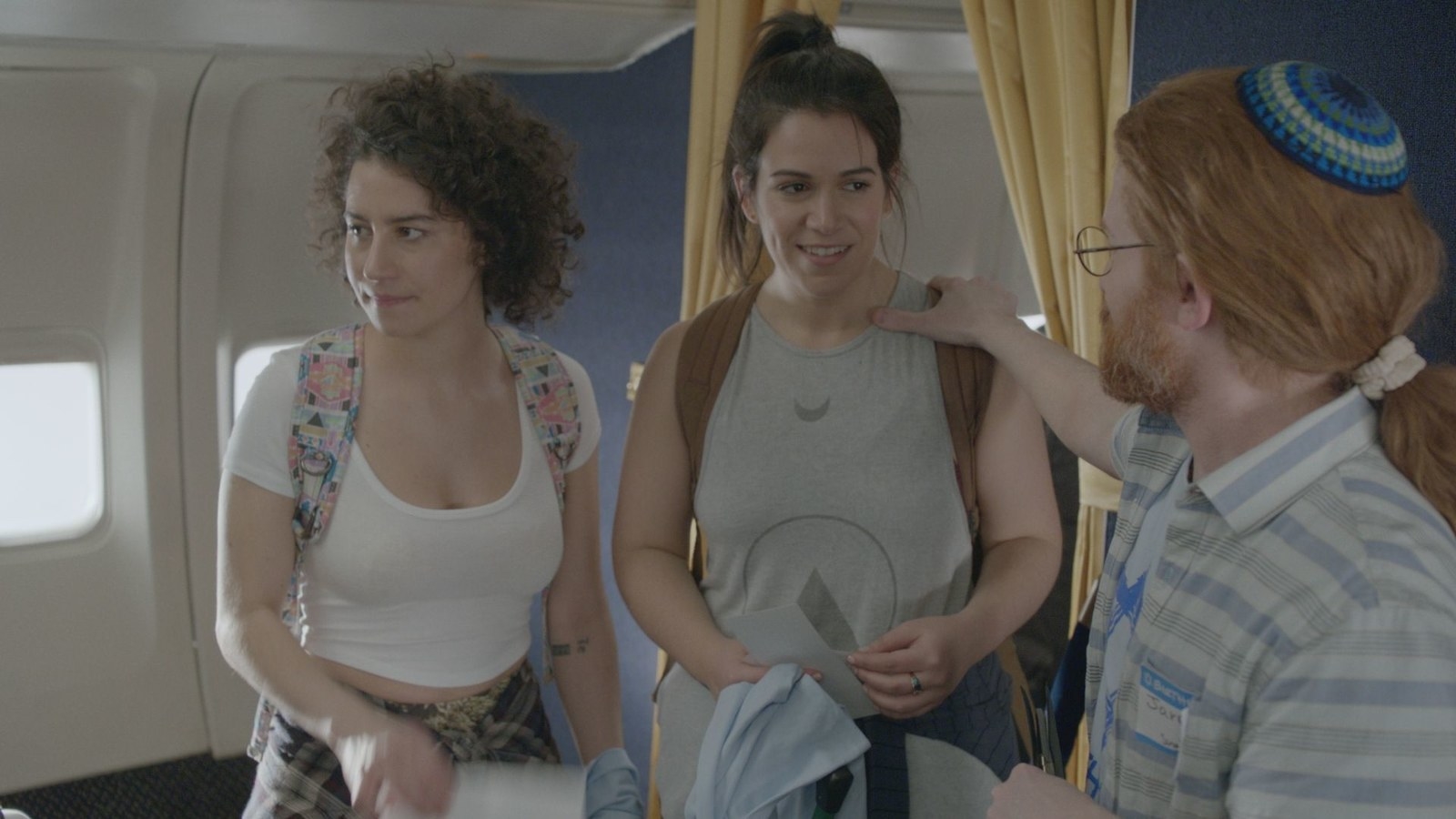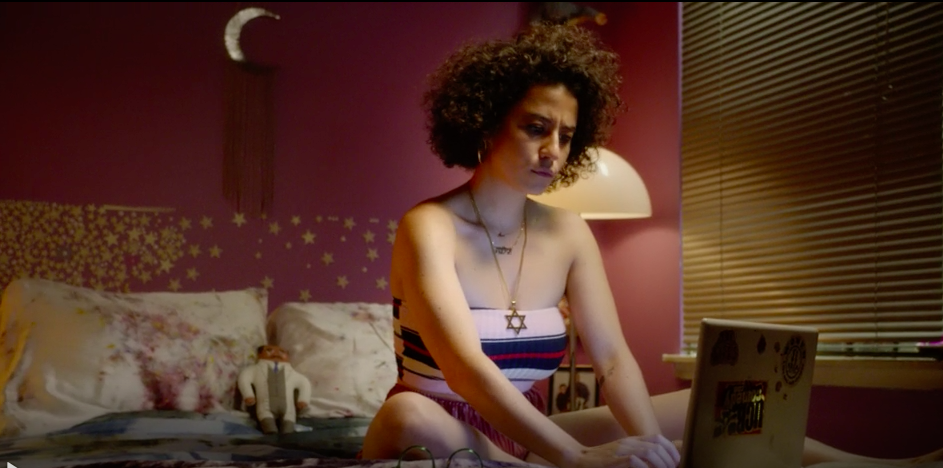
While tripping heavily off a strong dose of shroom-laced yogurt, Ilana Wexler, one of the two titular broads in Comedy Central’s Broad City, stands in front of a bathroom mirror. She’s about to have a threesome, but her typically horny self can’t seem to get in the mood. “I’m brave and I am super cool,” she proclaims. “It’s me...Nicki Minashkenazi!” merging the inimitable rapper’s moniker with that of Ilana’s own Eastern European Jewish heritage.
This scene, from the fourth season, is a perfect snapshot of Ilana’s bombastic attitude. She’s brashly self-confident, charmingly narcissistic, and also, notably, unabashedly Jewish.
Broad City’s final episode airs tonight, bringing five seasons of wild stoner hijinks to a close with a resounding exhale. The show, which debuted on Comedy Central in 2014 after years as a cult web series, ushered in a brand of humor that was slapstick and bawdy while also being deeply compassionate toward its two stars. Best friends Abbi (Abbi Jacobson), an artsy klutz with the “ass of an ageless angel,” and Ilana (Ilana Glazer), a sex-positive extrovert with a trail of job dismissals, fail at many things. But they always seem to do so with the flair of a modern-day Laverne and Shirley; instead of belting out “Schlemiel! Schlimazel!,” they’re falling headfirst down a crevasse between two buildings (a real thing that happened to Abbi this season). Another way to describe the show? Hella Jewish.

Jewish humor isn’t exactly a new addition to popular culture, and the list of Broad City’s television predecessors, from Rhoda to Seinfeld, is long. But Abbi and Ilana’s particular take on the contemporary Jewish experience resonates deeply with me, as a millennial Jewish woman. They Skype through the final hours of a Yom Kippur fast; Ilana screams “this is the happiest day of my liiiiife!” in response to learning that Abbi is pegging her hot neighbour — at her grandmother’s shiva.
Traditionally, Jewish humor has centered around tropes of guilt and self-deprecation. Consider Joan Rivers, whose zingers were based on putting herself, and others, down. (“I was so ugly that my parents sent my picture to Ripley’s Believe it or Not. They sent it back and said, ‘We don’t believe it,’” went one of her classics). On television, being Jewish has often been used as a self-deprecating punchline — see Larry David buying fraudulent High Holiday tickets off a scalper and being accused of being a self-hating Jew for listening to Wagner on Curb Your Enthusiasm — or it’s downplayed altogether (think of Jerry Seinfeld’s fascination with dating “shiksas” on Seinfeld or Ross’s neutered, nebbish character on Friends).
Broad City’s lineage, then, could be more rightly traced to The Nanny, the 1993 sitcom starring Fran Drescher as a nasal, unabashedly Yiddishe fashion queen turned caregiver to a waspy Upper East Side family. Drescher’s character, Fran Fine, was a glamorously packaged bridge between the immigrant generation (her grandmother, Grandma Yetta, would frequently appear hilariously befuddled and bedazzled, with a Romanian-meets-Queens rasp) and the modern, assimilated New York Jew. And though, yes, Fran could border on the stereotypical (her zest for a good sale and a rich husband were mentioned in virtually every episode of the show), she was endearing and unapologetic. And the Broad City creators’ affection for Drescher is clear; she even guest-starred as Ilana’s Aunt Bev in a Season 4 episode, arguing with Ilana’s mother over who will inherit their late mother’s engagement ring.
Abbi and Ilana’s Jewishness, like Fran’s, has been front and center since Episode 1, when Ilana answers a classified ad placed for “two Jewesses” to clean a stranger’s apartment wearing lingerie. From there, that cultural — if not necessarily religious — identity has been a central current running through Broad City (Jacobson and Glazer have talked about growing up in Reform Jewish families, but neither is especially observant; Glazer described herself in a 2014 interview with Forward as “more Jewy than Jewish”). In the show, Ilana takes pride in her frizzy, curly hair, though her pride was hard-earned; in a flashback episode to 2010, Ilana straightens her hair to fit in with her waspish college roommates. She relentlessly teases Abbi about her “goyish” looking schnoz.

And as much as they love being Jewish, Abbi and Ilana aren’t afraid to dole out nuanced burns best appreciated by those who grew up in the community. Take “Jews on a Plane,” the third season finale, which was widely shared among my friends. The episode, a parody of Birthright trips to Israel, featured Abbi and Ilana stuck on a plane with seating arrangements organized by “match potential” and sporadic, summer camp–style chants of “Jews! Jews! Jews!”
This season saw the show’s deepest exploration into the duo’s Jewish identities with the episode “Lost and Found.” Ilana takes a genetic test that reveals she is 100% Ashkenazi Jew (“Yeah, no shit, ever seen a mirror?” her mother replies). She also discovers that she has “the richest history a millennial Jew can have” — a 16th cousin named Saul who lives in Manhattan and is a Holocaust survivor. Ilana is titillated (maybe a little too titillated) at the thought of grilling him about his experiences, and so she and Abbi visit Saul at his assisted living facility. He convinces them to sneak him out of the home. While at a drag brunch, he suddenly takes off (“We cannot be losing Holocaust survivors, not now, when the world is gaining Nazis somehow!” exclaims a panicked Ilana) and the duo are forced to go on a hilarious and a revelatory journey through Jewish New York. They start at the famed deli Zabars, take a sobering detour at the Holocaust Memorial Museum, and end at a really good sale. When they finally do find Saul — at Ikea, of all places — he says, “You know my motto: Never forget. Also, don’t remind me.”
The fact that Broad City has leaned so heavily into the duo’s Jewish identity in its final season feels pretty intentional. In response to the 2016 election, Glazer and Jacobson rewrote parts of the third season, setting the perennially summertime show in the dead of winter and bleeping Trump’s name. “I think the messaging that we’re more aware of now was always there, but now it’s much more urgent to articulate and name,” Glazer told the Daily Beast in 2017. And just this past fall, Glazer had to cancel an event at a Brooklyn synagogue because of anti-Semitic graffiti.

The show’s increasing embrace of Abbi and Ilana’s Jewishness makes sense to me. I never thought too much about my Jewish identity growing up. I lived in a Jewish neighborhood in suburban Toronto, attended Jewish private school, and came from a fairly observant Jewish home. My family checks most of the requisite boxes: closely knit, and with a fondness for Florida. Hilarious, too — my father came out the womb spouting self-deprecating jokes. (An annual family tradition is riding around town on Christmas Eve to admire the light displays, only to wisecrack about the fact that we can’t do the same.)
But as I’ve gotten older, embracing my Jewishness has become more of my “thing.” Like Ilana, I get a kick out of wearing oversized hoop earrings with dangling diamanté Jewish stars. I’ve changed my Instagram bio to “Big Jew” a few times (and then promptly removed it, for fear of trolls). And I’ve taken to sharing more of my family’s rituals, from decorating the seder tray to lighting the Sabbath candles. Because in the face of the world’s current state, it feels pretty damn good to champion my heritage on my own terms.
In the closing scene of “Lost and Found,” Ilana — wearing a Hebrew nameplate necklace layered over a Jewish star necklace and hoop earrings that spell “Jewess” — sits cross-legged in front of her laptop, writing an entrance essay for grad school. She narrates in her best Carrie Bradshaw: “I couldn’t help but wonder…I used to think being Jewish meant IBS, Tay Sachs, inherited trauma, and childhood contact lenses.” She takes a toke of her very fat joint, exhales, and continues. “But now I know being Jewish is about being resilient, having the strength to survive the Holocaust and perpetual exile, as well as being able to carry a stag table to the parking lot of an Ikea at 91 years old.”
It’s the Jewiest monologue we’ve gotten from the series and it’s a fitting send-up of the show. The pleasures and pitfalls of millennial Jewish women have never been so hilariously relatable through the eyes of Abbi and Ilana, and I’ve loved watching them celebrate our eccentricities in ways that breathe new life into one of comedy’s oldest tropes. As Broad City ends, I’m inspired to let my own freak flag fly.
It’s what Nicki Minashkenazi would want. ●
Randi Bergman is a Toronto-based writer and editor who covers a wide variety of topics. She hosts the Capsule ’98 Podcast, which delves into all things ’90s nostalgia with a slew of celebrity guests. Her first book, Toronto Makes, is out Sept. 23.
